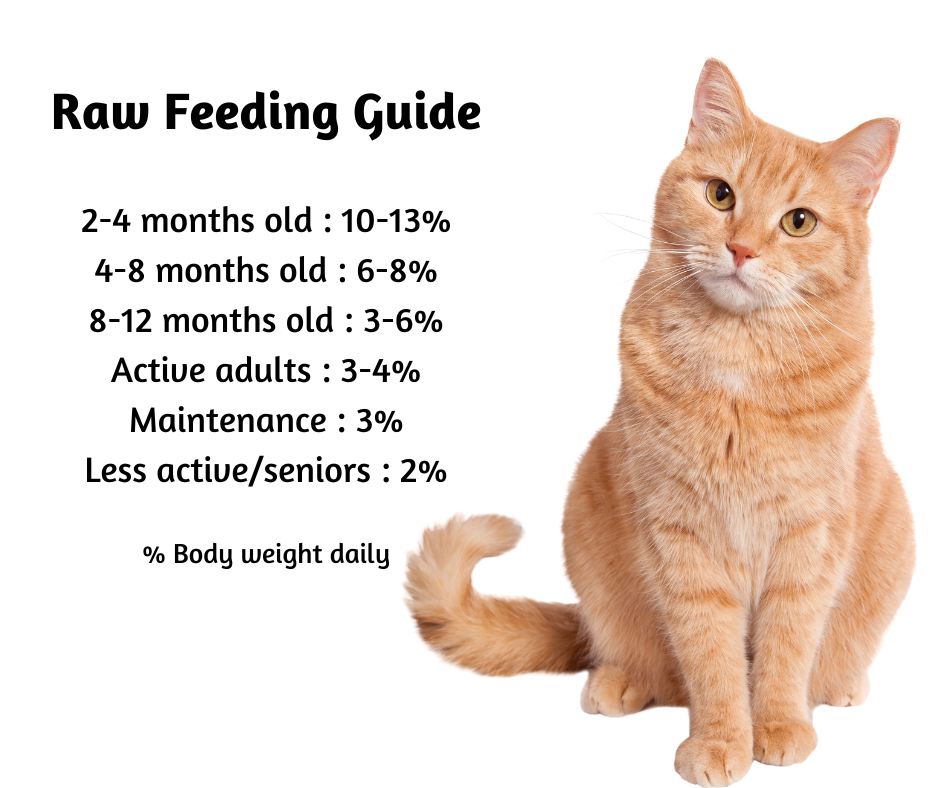How Much Raw Food Should I Feed My Cat, and How Often?
Determining how much to feed your cat doesn’t come with strict rules but there are general guidelines. For an adult cat on a raw diet, aim to feed between 2-4% of their body weight daily. This varies depending on your cat's activity level, metabolism, and overall health.
For example, a typical 5kg cat would ideally consume about 3% of its body weight each day, calculated as follows:
- 5kg x 3% = 150g of food daily
This amount works well for a healthy, relatively active adult eating exclusively raw food. However, factors like seasonal changes may influence your cat’s appetite—often less food in summer and more in winter. Trust your cat to guide their intake, adjusting quantities as needed.
If you’re unsure if your cat is eating enough, ask yourself:
- Are they eating at least 2% of their body weight daily?
- Are they active and not lethargic?
- Are they toileting regularly?
- Are their eyes clear and bright?
If you answer "no" to any of these questions, consider seeking advice from a veterinarian.
How Often Should I Feed My Cat?
Consider how cats eat in the wild: they hunt and consume multiple small prey throughout the day. Similarly, your cat benefits from several small meals rather than one large meal or grazing (which is unnatural for cats). Try to feed your cat at least three meals a day—more if possible. These meals don’t need to be evenly spaced and can fit around your schedule. Here’s an example routine:
- First feed at 5am
- Second breakfast at 8am before work
- First dinner at 4pm after work
- Second dinner at 8pm after playtime
- Final meal at 10pm before bed
Adopt this approach in a way that works best for you and your cat’s needs.
Feed the Cat in Front of You
Every cat is different. Some may eat more or less than the guidelines suggest. Keep in mind these guidelines are based on a raw diet. Cats on commercial diets high in carbohydrates often eat more to meet their protein needs. As you transition to a raw diet, adjust the portions according to your cat’s appetite, weight, and energy levels.
Feeding Kittens
Kittens grow quickly, so feed them on demand with as many meals as they want. Depending on their growth stage, kittens may eat 5-10% of their body weight daily. Growth spurts will naturally increase their appetite, while periods between spurts may see reduced hunger. Follow the same health checks as with adult cats, but if a kitten stops eating for more than 12 hours, consult a veterinarian.
A general rule is to start with 50g portions and adjust based on appetite. If the kitten eats it all and still seems hungry, offer more. If they’re content, you’ve found the right amount. If they eat only part of it, refrigerate the remainder and offer it later. Over time, you’ll learn their ideal portion size. Feed kittens at least five times daily, or more if they’re still hungry. This frequent feeding routine should continue until they reach adulthood, which is around 1 year for most cats or 2 years for larger breeds.
Key Takeaways:
- Use the guidelines as a starting point, then adjust based on your cat’s individual needs.
- Monitor your cat’s health and weight, but don’t stress too much over exact numbers.
- Ensure your cat is eating a balanced diet and enjoying their food. Don’t force them to eat something they dislike.
- Feed small, frequent meals to keep them satisfied, provide variety, and prevent overfeeding or underfeeding.
Ultimately, feed according to your cat’s preferences and nutritional needs, fostering a healthy, enjoyable diet that supports their well-being.

